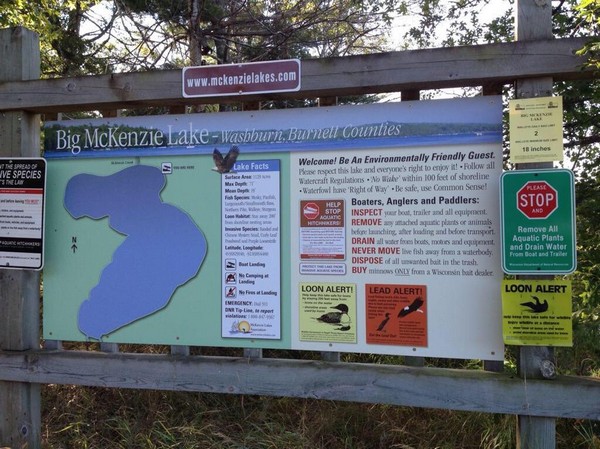 In November of 2016, zebra mussels (9 adults, all less than a year old) were discovered on one of our finest and most popular lakes – Big McKenzie Lake. It’s a significant discovery, because it’s the first inland zebra mussel population verified in Northwestern Wisconsin. It can and will affect other waterways over the course of the coming years. Historic data of populations that were found elsewhere show that a downstream spread to other lakes and rivers is highly possible.
In November of 2016, zebra mussels (9 adults, all less than a year old) were discovered on one of our finest and most popular lakes – Big McKenzie Lake. It’s a significant discovery, because it’s the first inland zebra mussel population verified in Northwestern Wisconsin. It can and will affect other waterways over the course of the coming years. Historic data of populations that were found elsewhere show that a downstream spread to other lakes and rivers is highly possible.
Zebra mussels are finger-nail sized bottom dwellers and are an invasive species from Europe and Asia that can affect our native species and negatively disrupt the current ecosystem and water quality of a lake. They resemble small clams with a yellowish or brownish D-shaped shell with alternating dark and light-colored stripes. Most are under an inch and they grow in clusters, attached to piers, rocks and other hard surfaces.
At this time, there is no known effective control method for the spread of zebra mussels. Every lake is different, as to the maximum number of animals the lake’s nutrients will support and some lakes have a higher dissolved calcium level than others, which makes them a more susceptible environment to support a zebra mussel population.
A team of state and local staff, along with university experts have joined together to work on a response to the outbreak. The best that can be done at this time is two-fold: awareness and removal.
Awareness is being built through online platforms like Facebook and online newspapers with media releases. Digital road signs, brochures and signage at the landings are being used as well. Creating a higher public awareness is the first step. Creating a personal willingness for people to help prevent the spread is the next. Sadly, there is no law requiring boaters to decontaminate their boats when they leave a lake.
Boat cleaning stations at the landings with power washing units have been successful when there are volunteers present to assist and remind boaters. But more volunteers are needed.
The Big McKenzie Lake Association is working diligently with the DNR to monitor, test and suppress this problem. Snorkel and dive teams will be used to manually remove zebra mussels and the awareness and education efforts will continue.
If we want to preserve the beauty and pleasures of our special lakes region, it will be incumbent on all boaters, no matter what lake they interact with, to inspect their boat and equipment, remove any attached aquatic plants or animals, drain all water from the boat and motor, dispose any unwanted bait in the trash and to buy bait locally. It’s the least we can do! – Wanda Boldon


